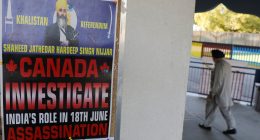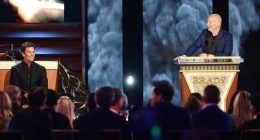
At its best, Apple TV+’s new series The Changeling has been called “the most unique fantasy show of 2023,” and at its worst “mediocre.” Director and executive producer Jonathan van Tulleken is fine with either assessment.
“When people don’t like it, they really don’t like it; when people love it, they really love it,” he tells The Hollywood Reporter of the strong reactions to the horror fantasy, which debuted its first three episodes on Sept. 8. “You never know how it’s going to go when you’re making something. All you can do is immerse yourself in the story, especially as the director, and hope that you get the best performances and the best visuals and that you can hold the story together and push it through.”
The TV adaptation of Victor LaValle’s 2017 bestseller of the same name was written by showrunner and executive producer Kelly Marcel, and is pegged as “a fairytale for grownups.” Not long after the birth of their son Brian, nightmarish circumstances befall main characters Apollo and Emma, played by LaKeith Stanfield and Clark Backo. What follows is an odyssey that uses European mythology, transcontinental African folklore, American ideologies and religious dogma to explore the perils of parenting, notions of fate and generational curses, and the question of whether any amount of nurturing can offset what has already been set in motion in nature.
“Kelly wanted to write something that was challenging and evocative, and dealt with very complex issues in the way that the best horror and, frankly, fairytales, can. That’s what stories are there to do: Help us engage with real trauma and real pain. And she wanted to do that in a way that honored the novel,” says van Tulleken. “The novel is a very sophisticated piece of writing and Victor is amazing at using the genre to smuggle big, and also personal and evocative, ideas to hook people in and make them think.”
The idea of using lore and horror fantasy to offer commentary on postpartum realities and what happens when women are forced to return to the workplace too soon after giving birth is admittedly outside of many viewer’s comfort zones, adds van Tulleken who says the series is “deliberately unconventional.” Yet the success of its execution, from his perspective, isn’t so much about audiences immediately grasping all of the compounding themes within season one’s eight episodes, but rather that the approach to the series gives them an alternative way to do so. (Read THR‘s review here.)
“When you make something that really tries to be ambitious and bold and not the kind of telly that you can cook dinner to or be on TikTok while you’re watching, that you’ve really got to engage with and lean forward into, it’s tough,” he says. “I’m very proud, and I’m even weirdly proud of the negative reviews, because I feel like even the negative reviews are saying: Holy shit, they really tried something. And that’s the kind of TV I’m interested in making.”
What was the biggest challenge in taking what Victor LaValle had on the page and translating it for an eight-episode series?
The challenge was to take all of that first-person internal world that Victor had written about and channel that into something that is experiential visually. Victor created this fairytale version of a place and people who are very rarely represented in fairytales, and I think that’s incredible. I read the book when it came out, and I’m a new father and I live in the neighborhood that Victor sets it in — Washington Heights and Harlem — and it blew my mind that he was able to evoke a sense of the mystical and the magical in what is such a real place, and also what is such a sort of cinematically real place. We have seen a lot of New York. That was the other thing that was really interesting in trying to tackle this: How do we create a New York that has a fairytale quality to it that feels like it could have this dark mystical throughline, and also capture a real poetic verité as well to make it believable? We didn’t want to make it unbelievable. We didn’t want to make it a Disney New York. We wanted to make it where you could go, “Whoa, I sort of believe there could be that place.”
In doing that, it was fascinating to then go out and scout all of these places, because New York has such a dense subculture. It also has so many stories in it. America’s a very new country compared to where I come from. I’m from London. But New York almost feels like it has more history than when you are somewhere like England or France, because it has everyone’s history. That was fascinating to go and find. I never realized there was North Brother Island, and it’s incredible. We went and filmed all around it, and it really does have the old hospital on it, which is falling apart and it’s just a hundred meters off from the most modern urban environment in the Bronx that you can imagine.
Some early reviews have criticized the pacing of the first two episodes, while acknowledging it’s on par with the novel. Why was it important to maintain that slow build up to the action that comes in episode three?
I think we wanted to not succumb to “pilotis,” and to think of our audience as sophisticated and thoughtful watchers who are in it for the long haul. If you want to come into something with a big explosion, this isn’t that show. But we hoped that by building the grounding of the characters, and by building this sort of beautiful world and building their relationship, that would then lay the groundwork for the rest of the story for the narrative. If you just jump into the genre, if you just jump into the horror, then you kind of cheat it. It becomes a gimmick. To be honest, there are enough shows out there that do that. There are enough shows and films out there if you want your absolutely pure horror fix. We were aiming for something more than that. By the way, that’s not to besmirch any of those things; I love pure horror. But I think we were looking at a lot of those great ’70s horrors where they do build, they do take their time — Rosemary’s Baby, The Shining — any number of those classics where there’s a drip of unsettling-ness. That feeling of something uncanny. Obviously, it takes some patience, but it’s like a book. You know if you sit down and open it up, you’re going to be drawn in and live in this world.
Lakeith Stanfield feels like the perfect choice for the lead in this out-of-the-box kind of narrative. How does his interpretation of Apollo serve the story?
I’m sure everyone says this about the stars they work with, but LaKeith is amazing. He’s incredible to work with. He was so committed and immersed in the character, so thoughtful about it; bringing a lot of his own experience as a dad to the role. He really took ownership of the series and collaborated with Kelly and Victor on Apollo. It’s one thing to do that in a movie where that may only last a month-and-a-half, but to see someone commit like that every day over what was a six-month period — and a lot of the time, have very harrowing material — and being, when he’s on camera, the locust of the scene, that’s astounding. And I’ve got to say that he brought that same level in pre-production, during production and in post-production, just committed and thoughtful and inspiring and also super positive and pushing and understanding of what makes the show good and collaborative.
The series tackles parenting from both gender perspectives, but there’s a greater emphasis on the experiences of motherhood, despite Apollo being the protagonist. Was there ever a thought to tell the story from Emma’s point of view?
The interesting thing about the book is that it’s entirely from Apollo’s perspective. Emma is essentially a mystery in the book, and Victor felt like he understood what it was to be a new dad so he could write Apollo. What Kelly did coming in was fully introduce Emma, and that was with Victor’s entire blessing. There is so much more Emma in the show than there is in the book. And I think if there were another season, it would even be more. I think that’s kind of the fun of it, it starts with Apollo and then you slowly reveal that really, this is Emma’s story as much as his. That’s something Kelly really brought and felt was very, very important — that Emma had to be a sort of co-conspirator in this and had to be a real lead. It’s that balance of trying to keep some of the mysteries. You can’t reveal Emma too early. But you also had to make sure that she didn’t get lost and that we did really give her some focus.
Daniel Fienberg, in his review of The Changeling, said one of the questions he’s left with is who is the actual hero in the story. Is there one?
Truthfully, I think Emma’s the hero. And I think if people stay with the show and if the show does get to tell more of the story, there’s no doubt that Emma is the hero. It’s really interesting that Apollo is perceived to be the hero. That our natural inclinations as audience members, and maybe even our stereotypes of society, is to view the man as the hero, tragically, is something that is actually undercut by the series as it goes on. There is a deliberate change and it’s up to you whether you buy into that or not. But again, to the unconventionality of it all, that was done quite deliberately. It’s not quite a switch and bait, but there’s something that we are playing with there.
As the series goes on and delves deeper into various folklores, it almost feels as though you don’t know what fairytale you’re in, or perhaps whose?
What was interesting was when we were looking at the fairytale of The Changeling, every culture has a changeling fairytale because, obviously, postpartum depression is a universal thing that has affected people since humans presumably have been giving birth, and it’s dealing with the trauma of parenthood. Parenthood is beautiful, but it’s also alienating and terrifying. And that is its beauty, right? Beauty comes from challenge. And what was interesting was going: Yes, this is a Nordic fairytale, but actually it exists everywhere and there’s all these different permutations and interpretations of it. And, again, that’s something where there’s more to explore. This was just a taste of it.
Comparisons are starting to be made between The Changeling and Them and Lovecraft Country, which I think speaks more to the fact that the Black horror fantasy catalog is so limited than it does the actual similarities between the material, because race is treated so differently in this series compared to the others.
Obviously, Victor could speak much more eloquently about this than I could, but I think that he doesn’t actually ever say the characters’ race explicitly. You do know and you definitely realize it, but you can be reading Victor’s novel and all your stereotypes and your basic assumptions of what people look like in a hero’s journey starts off one way and then all of a sudden you realize, that’s not this story. I think that’s where Victor’s very, very powerful. He lets that speak for itself. He’s not interested in beating anyone around the head with it. He’s interested in just letting it be that what is evocative is that: This is the case. That it’s set in Harlem, that it does involve a Black couple, that it’s about Black fatherhood and Black motherhood and, definitely, the subtext and the text is the real genuine challenges that come with that. By the way, I do not claim to be a mouthpiece for this at all, I’m just the person who can speak right now due to the strike. I can see the parallels of Lovecraft and Them, but I think there are also many, many other parallels to be drawn. And for me, certainly, I think that’s a really powerful thing because it should be framed as universal.
Is there a key message or a key question you’re hoping audiences are left with after finishing season one?
I want people to continue the journey. The ending is deliberately designed to say: This wasn’t in anyone’s head. This wasn’t postpartum depression. Emma’s not crazy. Emma is to be believed. The world is there to be expanded incredibly, and I hope that people feel that at the end and that they’re excited to see it expand outwards. Where we end is only halfway through Victor’s book.
Interview edited for length and clarity.
The Changeling releases new episodes Fridays on Apple TV+.
Source: Hollywood









